
When it comes to your monthly expenses, some are more important than others. Your budget might have 100 different spending categories, but the most important ones — your necessities — are the ones critical to your health and safety. That includes your rent or mortgage, food, medical expenses and utilities.
When money is tight, some budget expenses can be eliminated or suspended, but you’ll always need to have enough for utility bills. With that said, there are ways to reduce those costs, too.
A Percentage of Your Income
Some people like to think of monthly expenses in terms of the percent of your income they take up, rather than a flat dollar amount. For example, experts have recommended spending less than 30% of your gross monthly income (before tax) on housing, and around 8% to 10% on utilities.
But their recommendations might be outdated, since they can be traced back to a government standard introduced in the 1960s. While expert recommendations can serve as guidelines, they’re far from perfect. Today, government agencies define utilities above 6% of your income as a high energy burden.
Of course, the less income you have, the higher the percentage of your budget you’ll devote to energy. According to the American Council for an Energy-Efficient Economy (ACEEE), low-income households spend 17.8% of their income on energy bills and transportation fuel.
Local Averages
You’ll get a more realistic idea of what utilities should cost each month by checking with your local utility providers, a realtor or even your neighbors. You might be able to find reports on the average monthly costs for utilities in your area or costs by square foot. If you’re buying a home, ask the seller what their utility costs were.
To find the most accurate figures for your budget, check into the cost of all of the following utilities that you’ll have to cover:
- Electricity
- Water and wastewater
- Gas
- Garbage removal
- Cell phone
- Internet
Cell phone and internet services typically charge a flat monthly fee, so the best way to save money is to pick the most affordable provider upfront. For internet, you may be able to save money by opting for a slower speed, since upgraded plans don’t often make enough difference to warrant the cost.
Your Past Average
According to the Federal Reserve Bank of St.Louis, the cost of fuel and utilities in the average U.S. city went from $244 in January of 2020 to $314 in January of 2024. But your expenses might not resemble the current average.
Once you’ve lived in your home for a few months, you can get a better idea of your average monthly utilities by looking over past bills. Of course, the expense will fluctuate seasonally, especially if you live in an area with extreme weather patterns.
If you can, take the extra time to look at your bills for the last year or more to get an idea of what your average monthly cost is from one season to the next.
Saving Money
If you need to get your utility costs down, one option is to shop around. You might get a better deal by negotiating and checking prices with different companies, especially if it’s been a while since you choose your providers. A few other ways to bring down your utility costs:
- See if your provider has a Green Energy Plan
- Find out if you qualify for one of your provider’s financial assistance program
- Look into budget billing, which that lets you pay a set rate each month based on your estimated energy costs for the year
- Get a free, professional energy audit and apply the personalized tips
- See if you’re income-qualified for Low Income Home Energy Assistance Program (LIHEAP) or a state-based program that helps with home energy bills or weatherization
Professional Help is Available
Utilities can add up fast and take up a big chunk of your budget. Unfortunately, many traditional budget models don’t account for these high costs, so standard guidelines might not be much help. However, you might be eligible for reduced utility bills or other assistance depending on your situation. You can also get advice on how to cover utility bills or other bills, including credit cards and student loans, from an NFCC-Certified Credit Counselor.